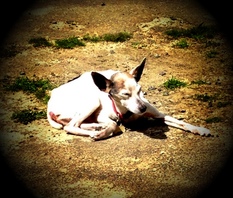|
You can follow my posts on English Informer in France as well as on Ex-Pat Radio
Losing your best friend: Coping with the death of a pet I recently had an inquiry from someone wanting to know about coping with the death of a pet. This seemed particularly pertinent as just this week I have had make the decision that every pet owner dreads, and have scheduled my elderly dog for his last trip to the vet. Many people share an intense emotional bond with the animals in their lives, they are part of our daily routine for many years and often we derive comfort from them when we feel the need for support and affection. My own dog, for example, was the one reason I hung in there and kept going during a period when I felt particularly alone and lacking in control of my life. The grief we feel when our animal companions die can be intense, and can vary according to factors such as the role the animal played in our life, its age and the circumstances of its death. If you live alone and your pet is your only companion, or if it was an assistance animal such as a guide dog, then you may feel the loss to be overwhelming. As with any death there is no right way to grieve, it is a very individual process. Whether you feel the need to cry intensely for a few days, or you feel your grief continues to return in waves over months or even years, allow yourself the space to be immersed in the feelings and then breathe your way back again. With the passing of a human we have rituals to mark the transition, such as a funeral or a wake, and these occasions are important in helping us to grieve and move on. You might find it would be helpful to have some way of marking the passing of your companion animal, such as a burial in the garden or a gathering of folks who knew your pet. Children, especially, will benefit from inclusion in the process and an understanding that sadness is a normal part of life. Pets are often their first introduction to the process of life and death, and an important way of learning to understand the emotions that accompany this event. Sometimes people devalue the loss of an animal as they feel it is not in any way similar to the loss of a person. Don’t be distressed about whether your grief is appropriate or not, just find people who understand how you are feeling and who will be there to support you. After the death of your pet, be kind to yourself and remember the good times you shared and the love they brought to you. Maybe it would be helpful to create some kind of memorial such as a scrapbook or a tree planted in their name? Grief is a natural, if painful part of life. The feelings will decrease in intensity over the years, and slowly you will adjust your routine and move on, possibly to even considering sharing your home with another animal in the future. If you feel, however, that your emotions are leading you to become depressed and less interested in life, or if you have had other major losses at the same time such as a child leaving home, the loss of a job, or other bereavements, then do consider seeking professional help. Dr Jules If you are feeling stuck with your life and can’t see a way forward, then counselling can be helpful in providing support and a non-judgmental space to explore your options. For more in-depth help and counselling, consider contacting Dr Jules in person. This article is dedicated to memory of my dog Louis who passed away peacefully on 6th July, 2016. I wish you an eternity spent chasing squirrels little guy, and I will be forever grateful for your companionship.
0 Comments
Leave a Reply. |
Categories
All
Archives
July 2020
|

